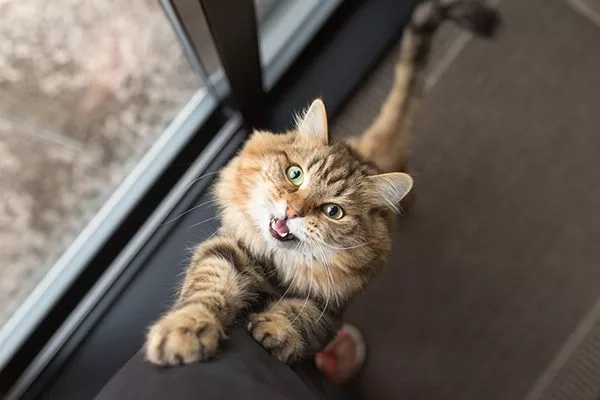
Our Veterinary Blog
6 Reasons Your Cat is Meowing Excessively
If you’re asking yourself, “Why is my cat meowing so much?” then you’ve come to the right place. Cats are known to be vocal creatures, and it can be difficult decoding everything they’re trying to say to us. But, if your cat is meowing more than usual, there could be a specific reason behind it.

Although cats normally communicate with a variety of vocalizations, such as meowing, yowling, hissing, or purring, excessive meowing could be a sign that something is wrong.
On the other hand, your cat could simply be trying to communicate their needs. In this article, we’ll explore six possible reasons why your cat might be meowing excessively, and some things you can do to help both you and your feline friend find peace.
What Is Excessive Vocalization?
“Excessive vocalization” means different things to different pet owners. Just by virtue of their personality, some cats communicate more than others. But in general, if your cat is meowing more than usual, and it’s disrupting your daily life or causing you emotional distress, then it might be considered excessive.
For example, you may be used to your cat meowing excessively when it’s time to eat dinner, but if they begin yowling in the dead of the night, something might be up. If this is the case, then consider these 6 common reasons why your cat might be meowing more than usual.
Why is My Cat Meowing Excessively?
1. Your Cat Wants Your Attention
There is a stereotype that cats are aloof loners who want nothing to do with people. While some cats may feel this way, the majority of cats love and crave attention and don’t like being alone very often.
If you find your cat incessantly meowing at you, they may be bored, lonely, or simply want your attention. A simple remedy is talking with your cat, giving them a good scratch behind the ears, or having a play session with their favorite toy.
2. You Cat Wants Something from You
Just like people and other animals, cats use their voice to tell you when they want something. If your cat is hungry, or even if their food bowl is empty, they may come to you to remedy the situation.
In fact, one of the most common reasons cats meow is because they’re hungry. Check to see if their food and water bowls are empty, and make sure your cat is getting enough food and not going hungry.
Cats also often meow to be let inside or outside, to gain access to another room, or even because they want you to change the channel on the television. Listen to your cat when they try and communicate with you this way, and you’ll begin to learn what their specific meows means.
3. Your Cat Wants to Breed
When female cats are in heat, they become extremely vocal. This means they will “yowl” for about a week every month. Additionally, if a male cat smells a female cat in heat, you will notice them meowing quite a bit more to try and find that female.
This is because your cat wants to breed, an entirely natural desire. Spaying or neutering your cat will help prevent this type of yowling and provide both you and your feline friend some relief.
4. Your Cat is Stressed
Have you experienced a recent change in your home, such as a new baby, an illness, loss of a loved one, or a recent move? If so, your cat might be more vocal because they are stressed. Cats become quite a bit more vocal when they are stressed, something you might have noticed before on a trip to the vet.
Help calm your cat down by alleviating stressors. If needed, give them extra attention and stability to help soothe their nerves.
5. Your Cat is Aging
Does your senior cat frequently yowl at night, waking up the entire house? This might be a sign that your pet is experiencing the effects of old age.
Like elderly humans, aging cats begin to experience cognitive or mental dysfunction, such as vision or hearing loss, along with forgetfulness. This can confuse them, making your cat easily dazed and disoriented. It is extremely common for senior cats to meow more frequently, especially at night.
Many cat owners report that installing night lights helps to put their senior cats at ease during the night. Additionally, keeping your environment stable and stationary will help your cat easily navigate their surroundings while decreasing confusion.
6. Something is Medically Wrong
If your cat is meowing non-stop, and this is a new behavior, then you will want to do a thorough checkup with your veterinarian. There are many diseases that can cause your cat to feel hungry, thirsty, or in pain.
Not only do these symptoms lead to excessive meowing but they also mean your cat is not feeling well. Additionally, cats are known to develop kidney disease or overactive thyroids, which can also cause increased vocalization.
Long story short, if you suspect your cat is meowing more because they are in pain or distress, it is a good idea to visit your veterinarian and rule out potential medical conditions.
What Should I Do About My Cat’s Excessive Meowing?
When your cat meows, it’s likely trying to communicate with you. Whether they want attention or food or are stressed, you should pay close attention and try to figure out what the root of their problem is. The best way is to understand what they are trying to tell you and then try to meet their needs in the most natural way possible.
If you can’t tell from context clues like how often they’re meowing, make sure to contact a vet for an expert opinion. They’ll ask about things like if there’s been any changes in your pet’s behavior lately and whether or not they have had any recent illnesses that could have caused them pain—which would lead more frequent yowling than usual due to discomfort. Don’t let this happen! Get help now so you don’t have to worry later on down the line when it might be too late.
Lakeland Animal Clinic is here for all cat owners in Lakeland, FL and the surrounding areas. If you have any questions about your cat’s health, give us a call at (863) 688-3338! We want to help be your pet’s hero.
Recent Posts
About Us
Family is family, whether it has two legs or four. At Lakeland Animal Clinic, we've spent the last 40 years healing and caring for your pets. As a family-operated practice, we know that family is about more than simply being related. Animals give us the ability to develop strong bonds and feel great compassion for a fellow living creature.
